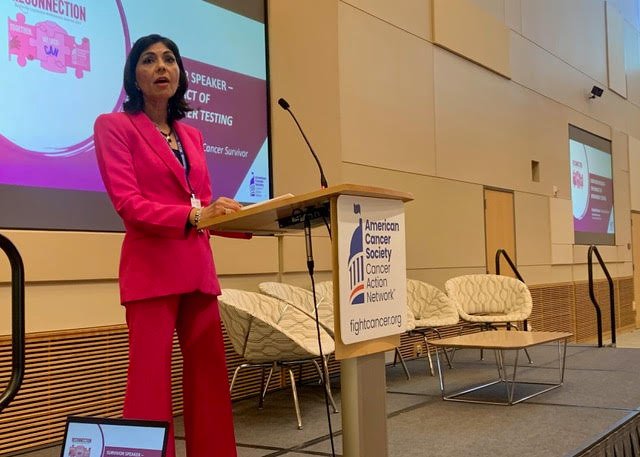
A Los Angeles Cancer Survivor On How She Personalized Her Treatment
India-West News Desk
LOS ANGELES, CA– It’s been over seven years since Punita Khanna was diagnosed with breast cancer. The diagnosis took her by surprise. Even after her mammogram showed something suspicious, she never thought she’d hear her doctor say, “You have cancer.”
“It was a total shock. I could only think about my young son losing his mom and how my husband would manage without me,” said Khanna.
Her surgeon suggested a lumpectomy and urged her to get biomarker testing, which would be a game-changer in her cancer journey.
Biomarker testing is vital to unlocking precision medicine, including targeted therapies that can lead to improved survivorship and quality of life for cancer patients and others with serious illnesses. In addition, biomarker testing could help patients save invaluable time, physical and emotional strain, and unnecessary costs by avoiding treatments that are likely to be ineffective or won’t be helpful.
“I was able to bypass chemotherapy thanks to my biomarker testing results indicating that the recurrence of my cancer was low. I did have to undergo radiation and hormone therapy, which produced its own side effects – such as excruciating bone and joint pain — but nothing like chemotherapy,” Khanna said.
Biomarker testing is increasingly important for cancer care and the treatment of other diseases including arthritis, autoimmune conditions, and rare diseases. Research is also happening in many other areas, including Alzheimer’s, other neurological conditions, cardiology and more. Additionally, the percentage of clinical trials that involve biomarkers has grown significantly (from 15% in 2000 to 55% in 2018); and nearly 60% of all cancer drugs approved in the last five years require or recommend biomarker testing before use.
However, insurance coverage for biomarker testing is failing to keep pace with innovations and advancements in treatment.
“It seemed strange to me that my insurance wouldn’t cover such an essential test that ultimately made my treatment plan less costly. Fortunately, I was able to pay for the testing out of pocket, but I know that’s not the case for many people. Everyone who could benefit from biomarker testing should have access to it, regardless of income, race, zip code or insurance type,” said Khanna.
Five years after her diagnosis, Khanna’s oncologist offered another biomarker test to help determine if extending her hormonal therapy would be beneficial. Just like the first time, her insurance would not cover the testing.
“I was elated with the possibility of stopping my hormone therapy if it would not benefit my type of cancer. So, I paid for the biomarker testing again, and the results indicated I could end the hormone therapy,” Khanna said.
At first, Khanna only told a few people about her cancer diagnosis.
“In the Indian community, there are cultural taboos that make the conversations around mental and physical health difficult,” she said. “But as a woman of color, I’m aware of the inequities in the system and know that communities of color, individuals with limited income, and people living in rural areas are less likely to receive guideline-indicated biomarker testing. I had to speak up to help others with their cancer journeys.”
In April, Khanna traveled to Sacramento to join scores of other volunteers with the American Cancer Society Cancer Action Network (ACS CAN) in urging legislators to ensure comprehensive biomarker testing is covered by more insurance plans, including Medi-Cal, when supported by medical and scientific evidence. Most recently, she moderated the South Asian American Policy & Research Institute’s webinar on breast cancer awareness.
“I’m sharing my story in the hope that everyone is given the same access to advancements in science so that they too can benefit from improved testing, therapeutics and treatment resulting in better outcomes and lower health care costs,” Khanna said.
Approximately 192,770 Californians will be diagnosed with cancer this year. For more information on how ACS CAN is advocating for cancer patients and survivors on the local, state, and federal levels or to learn more about how to get involved, visit FightCancer.org/CA.
About ACS CAN
The American Cancer Society Cancer Action Network (ACS CAN) advocates for evidence-based public policies to reduce the cancer burden for everyone. We engage our volunteers across the country to make their voices heard by policymakers at every level of government. We believe everyone should have a fair and just opportunity to prevent, detect, treat, and survive cancer. Since 2001, as the American Cancer Society’s nonprofit, nonpartisan advocacy affiliate, ACS CAN has successfully advocated for billions of dollars in cancer research funding, expanded access to quality affordable health care, and advanced proven tobacco control measures. We stand with our volunteers, working to make cancer a top priority for policymakers in cities, states, and our nation’s capital. Join the fight by visiting www.fightcancer.org.
FOR MORE INFORMATION, CONTACT: Priscilla.CabralPerez@cancer.org 720-450-1512




